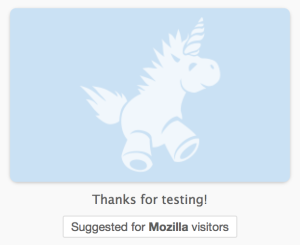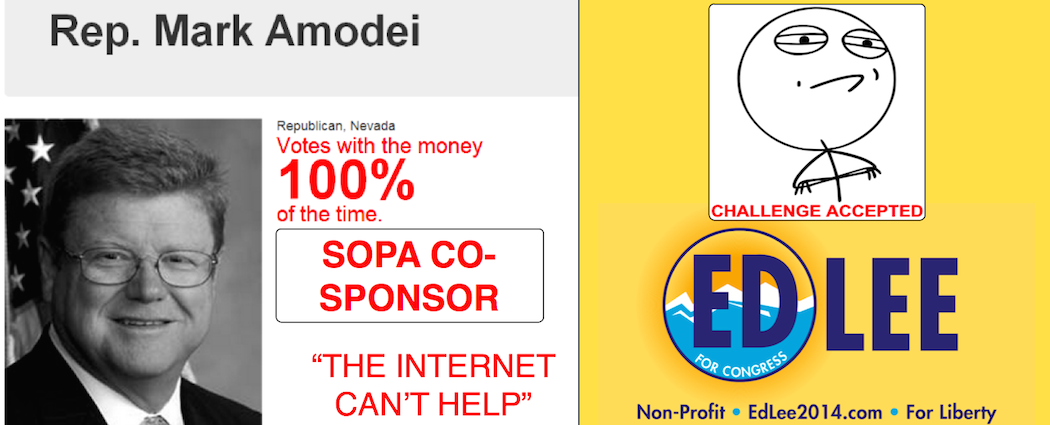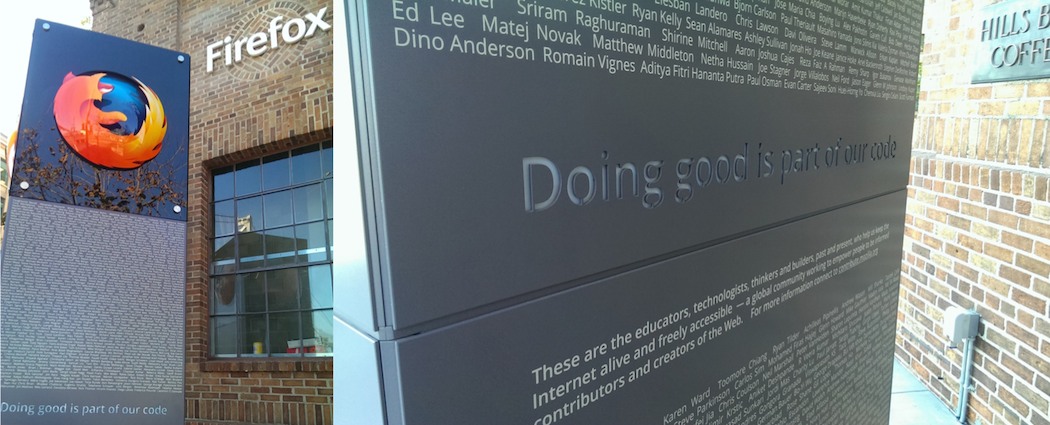23 April 2015 - 11:11Whys and Hows of Suggested Tiles
As Darren discussed on Monday’s project call [wiki.mozilla.org], Suggested Tiles has been on track to go live to a larger audience next week for wider beta testing. I’ll provide some context around why we implemented this feature, details of how it works, and open questions of how to make it even better.
We’ve been looking for ways to improve the user experience within Firefox by combining data that Firefox knows about with data Mozilla can provide. We’re also in a good position to work with the advertising ecosystem so that we can change it to care more about the values Mozilla cares about. We want to create advertising products that respect user’s choice/control over their data and get others interested by showing money can be made.
Last November, we launched Tiles with a framework to show external content within Firefox’s new tab page. A relatively small portion of Firefox users saw these because they only showed up if there would have been empty tiles, i.e., new users with little history or existing users who cleared history. Suggested Tiles expands on this to be a little bit smarter by showing content based on the user’s top sites. For example, if a user tends to visit sites about mobile phones, Firefox can now decide to show a suggestion for Firefox for Android.
We intend to bring value to users by showing them content that they would be interested in and engage with. On the flip side, this means we purposefully hold back on showing content that users might get annoyed with and block. We do this in a way that requires using a minimal amount of the user’s data, and as usual, we provide controls to the user to turn things off if that’s desired. For the initial release of Suggested Tiles, we plan to show content from Mozilla such as mobile Firefox, MDN, and HTML5 gaming.
The Tiles framework has been built in ways that are different from traditional web advertising in both how it gets data into Firefox [blog.mozilla.org] and how it reports on Tiles performance. The two linked posts have quite a bit of detail, but to summarize, Firefox makes generic encrypted cookieless requests to get enough data to decide locally in Firefox whether content should be added to the new tab page. In order for us to have data on how to improve the experience, Firefox reports back when users see and click on these tiles and includes tile data such as IDs of added content but no URLs. We have aggressive data deletion policies and don’t keep any unique identifiers that can be associated with our users.
The technical changes to support Suggested Tiles are not overly complex as the server provides one additional value specifying when a suggestion should be shown. This value informs Firefox which sites need to be in the user’s top sites before showing the tile. The reporting mechanism is unchanged, so if a Suggested Tile is shown or clicked, Firefox reports back the tile’s ID and no URLs just as before.
Even though the technical changes are not too complicated, the effect of this can be significant. In particular, Firefox reports back if it shows a Suggested Tile, and if that tile is only shown when the user has been to one of various news sites, Firefox reveals to our servers that this user reads news. Our handling of the data is no different from before.
Because we care about user privacy, we have policies around how/what suggestions can be made. For example, to match on news sites, we make sure there’s at least 5 popular news sites for Firefox to check against. This makes it so there’s user deniability of which site the user actually visited. We also focus on broad uncontroversial topics, so we don’t make suggestions based on adult content or illegal gambling sites.
An additional layer of protection is built into Firefox by only allowing predefined sets of sites [hg.mozilla.org] for making suggestions. These include mobile phones, technology news, web development, and video games. This rigidness protects Firefox from accepting fake/malicious suggestions that could reveal data Mozilla doesn’t want to collect.
This last point is important to highlight because we want to have a discussion around how we can be more flexible in showing more relevant content and fixing mistakes. For example, people who care about video games might only care about a specific gaming platform, but because Firefox only allows for the predefined sites, we would end up suggesting content that many users didn’t actually want to see.
Feel free to respond with comments about Suggested Tiles or to join in on the discussion about various topics on dev.planning [groups.google.com]:
- Improving trust and transparency for Suggested Tiles
- Ideas for policies to protect Suggested Tiles users’ data
- Suggesting tiles by region with finer granularity than country
- Potential privacy issues of not showing suggestions in certain contexts
As usual, we have the source code available for Firefox [hg.mozilla.org] and our servers that send/receive tiles data [github.com], create tiles, and process tiles data. You can also find additional details in the Directory Links Architecture and Data Formats documentation [people.mozilla.org].
1 Comment | Tags: Content Services, Development, Mozilla


